Choosing the right Content Management System (CMS) can feel like navigating a minefield. With so many options vying for your attention, how do you decide which one will truly empower your business to thrive online? The stakes are high. Your CMS impacts everything from website design and content creation to marketing automation and lead generation.
Today, we’re putting two heavyweight contenders head-to-head: HubSpot CMS and WordPress. We’ll dissect their strengths, weaknesses, pricing, and ease of use to help you determine which platform aligns best with your specific business needs and goals. Get ready for a deep dive that cuts through the marketing jargon and delivers practical insights you can use today.
Quick Summary:
- WordPress offers max custom control, but needs maintenance.
- HubSpot provides ease of use and integrated marketing.
- Choose based on your technical skills, budget, and business needs.
Table of Contents
- Understanding the Contenders: A Quick Overview
- WordPress: The Open-Source Giant
- HubSpot CMS Hub: The All-in-One Powerhouse
- Head-to-Head Comparison: HubSpot CMS vs. WordPress
- 1. Ease of Use: Is it User-Friendly or a Technical Nightmare?
- 2. Design and Customization: Expressing Your Brand’s Unique Identity
- 3. SEO (Search Engine Optimization): Getting Found on Google
- 4. Security: Protecting Your Website from Threats
- 5. E-commerce Functionality: Selling Products Online
- 6. Marketing Automation and Integrations: Streamlining Your Marketing Efforts
- 7. Scalability: Growing with Your Business
- 8. Pricing: What’s the Real Cost?
- Choosing the Right CMS: Key Considerations
- Real-World Scenarios: HubSpot CMS vs. WordPress in Action
- Qrolic Technologies: Your Partner in Digital Success
- Making the Final Call: It’s All About Your Needs
Understanding the Contenders: A Quick Overview
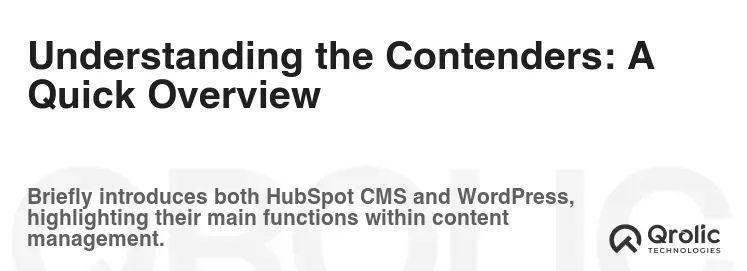
Before we plunge into the nitty-gritty, let’s quickly understand what each platform brings to the table.
WordPress: The Open-Source Giant
WordPress, often lauded as the king of CMS platforms, powers over 40% of the internet. That’s a staggering statistic, and it speaks volumes about its versatility and power. At its core, WordPress is an open-source CMS, meaning the software is free to use and modify. This open-source nature has fostered a massive community of developers and designers who contribute themes, plugins, and support resources.
Key Characteristics of WordPress:
- Open-Source and Free (Core Software): This accessibility makes it an attractive option for businesses of all sizes. However, costs can quickly escalate with premium themes, plugins, and hosting.
- Extensive Customization: WordPress boasts an unparalleled level of customization. You can tailor your website’s design and functionality to your exact specifications, limited only by your imagination (and budget).
- Vast Plugin Ecosystem: The WordPress plugin directory is a treasure trove of add-ons, offering everything from SEO optimization to e-commerce functionality.
- Steep Learning Curve (Potentially): While WordPress is relatively user-friendly for basic content creation, mastering its customization options and troubleshooting plugin conflicts can require a significant time investment.
- Maintenance Responsibility: With WordPress, you’re responsible for all aspects of website maintenance, including updates, security patches, and backups. This requires ongoing attention and technical know-how.
HubSpot CMS Hub: The All-in-One Powerhouse
HubSpot CMS Hub is part of the HubSpot ecosystem, known for its marketing, sales, and customer service tools. Unlike WordPress’s open-source approach, HubSpot CMS Hub is a proprietary platform, meaning it’s developed and maintained by HubSpot. It aims to provide a more streamlined and integrated experience, particularly for businesses heavily invested in inbound marketing.
Key Characteristics of HubSpot CMS Hub:
- Part of the HubSpot Ecosystem: Seamless integration with HubSpot’s other tools, like CRM, marketing automation, and sales platforms, is a major selling point.
- Built-in Marketing Tools: HubSpot CMS Hub comes equipped with a suite of marketing tools, including SEO recommendations, blogging platforms, and lead capture forms.
- Drag-and-Drop Interface: Creating and editing pages is a breeze with HubSpot’s intuitive drag-and-drop editor, requiring minimal coding knowledge.
- Security and Maintenance Managed: HubSpot handles all the technical heavy lifting, including security updates, performance optimization, and backups.
- More Expensive than WordPress (Potentially): HubSpot CMS Hub is generally more expensive than a basic WordPress setup, especially as your needs grow and you require higher-tier plans.
- Less Customization Flexibility: While HubSpot CMS Hub offers customization options, it’s not as open-ended as WordPress. You’re somewhat constrained by the platform’s existing features and templates.
Head-to-Head Comparison: HubSpot CMS vs. WordPress
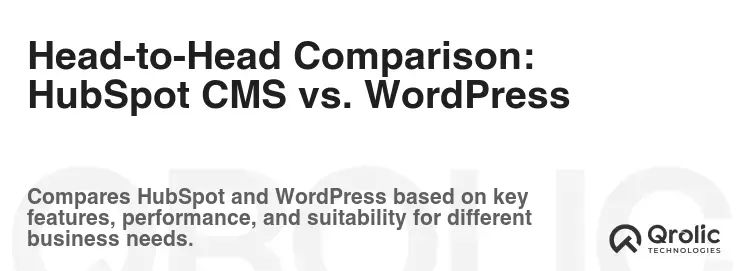
Now, let’s break down the key differences between HubSpot CMS Hub and WordPress across several critical areas:
1. Ease of Use: Is it User-Friendly or a Technical Nightmare?
This is a crucial factor for businesses without dedicated web development teams.
-
WordPress: WordPress, after installation, is generally easy to use for basic content creation. However, customizing themes, managing plugins, and troubleshooting issues can be challenging for beginners. The admin interface can feel cluttered, especially with numerous plugins installed.
-
HubSpot CMS Hub: HubSpot shines in this area. Its drag-and-drop editor makes creating and editing pages incredibly simple. The interface is clean, intuitive, and geared towards marketers and content creators. Even non-technical users can quickly build professional-looking websites.
Verdict: HubSpot CMS Hub wins on ease of use. Its intuitive interface and streamlined workflow make it ideal for businesses that want to focus on content creation without getting bogged down in technical complexities.
2. Design and Customization: Expressing Your Brand’s Unique Identity
-
WordPress: WordPress offers unparalleled design flexibility. Thousands of themes, both free and premium, are available. You can customize these themes extensively using code or page builders like Elementor and Divi. This allows you to create a truly unique and brand-aligned website. However, this level of customization requires technical expertise or the assistance of a web designer.
-
HubSpot CMS Hub: HubSpot offers a selection of pre-designed templates that are easily customizable using its drag-and-drop editor. While you have control over the layout and content of your pages, the overall design freedom is more limited than WordPress. If you need highly specialized features or unusual design elements, you might find HubSpot CMS Hub restrictive.
Verdict: WordPress wins on design and customization. Its open-source nature and vast ecosystem of themes and plugins provide unparalleled flexibility to create a truly unique website.
3. SEO (Search Engine Optimization): Getting Found on Google
-
WordPress: WordPress itself is SEO-friendly, but its SEO capabilities are significantly enhanced by plugins like Yoast SEO and Rank Math. These plugins provide tools for optimizing page titles, meta descriptions, keyword research, and schema markup.
-
HubSpot CMS Hub: HubSpot CMS Hub has built-in SEO tools, including recommendations for keyword optimization, content analysis, and mobile responsiveness. Its integration with HubSpot’s marketing automation platform also allows you to track SEO performance and measure the impact of your content.
Verdict: Tie. Both platforms, when properly configured, offer strong SEO capabilities. WordPress, with the help of SEO plugins, can be highly effective. HubSpot CMS Hub’s built-in tools and marketing integration provide a streamlined SEO workflow. The key is understanding and implementing best practices on either platform.
4. Security: Protecting Your Website from Threats
-
WordPress: WordPress is a popular target for hackers due to its widespread use. Maintaining a secure WordPress website requires diligence in keeping the core software, themes, and plugins updated. You also need to implement security measures like strong passwords, two-factor authentication, and security plugins.
-
HubSpot CMS Hub: HubSpot handles all security aspects of your website, including updates, patching vulnerabilities, and protecting against malware. This relieves you of the burden of managing security risks and ensures your website is always protected.
Verdict: HubSpot CMS Hub wins on security. Its managed platform eliminates the need for you to worry about security updates and vulnerabilities.
5. E-commerce Functionality: Selling Products Online
-
WordPress: WordPress can be transformed into a powerful e-commerce platform with plugins like WooCommerce. WooCommerce offers a wide range of features for managing products, processing payments, and handling shipping. However, setting up and configuring WooCommerce requires technical expertise and careful attention to security.
-
HubSpot CMS Hub: HubSpot CMS Hub integrates with e-commerce platforms like Shopify, allowing you to build an online store and manage your products. However, its e-commerce capabilities are not as robust as those of WooCommerce.
Verdict: WordPress wins on e-commerce functionality, primarily due to the power and flexibility of WooCommerce. If you’re building a complex online store with extensive product catalogs and advanced features, WooCommerce is generally the better choice.
6. Marketing Automation and Integrations: Streamlining Your Marketing Efforts
-
WordPress: WordPress integrates with various marketing automation tools through plugins and third-party integrations. However, setting up these integrations can be complex and require technical knowledge.
-
HubSpot CMS Hub: HubSpot CMS Hub seamlessly integrates with HubSpot’s marketing automation platform, providing a unified view of your marketing efforts. This integration allows you to automate email marketing, lead nurturing, and other marketing tasks.
Verdict: HubSpot CMS Hub wins on marketing automation and integrations. Its tight integration with HubSpot’s marketing platform provides a streamlined and efficient workflow for managing your marketing activities.
7. Scalability: Growing with Your Business
-
WordPress: WordPress can be scaled to handle large amounts of traffic with the right hosting and optimization. However, scaling a WordPress website requires technical expertise and ongoing maintenance.
-
HubSpot CMS Hub: HubSpot CMS Hub is designed to scale with your business. Its managed platform handles the technical aspects of scaling, ensuring your website can handle increased traffic and data volumes.
Verdict: Tie. Both platforms can scale effectively, but the path to scalability differs. WordPress requires more hands-on management and optimization, while HubSpot CMS Hub handles scaling automatically. The choice depends on your technical resources and preference for a managed versus self-managed solution.
8. Pricing: What’s the Real Cost?
-
WordPress: WordPress is free to download and use. However, you’ll need to pay for hosting, a domain name, premium themes, and plugins. These costs can vary widely depending on your needs.
-
HubSpot CMS Hub: HubSpot CMS Hub offers several pricing tiers, ranging from free to enterprise. The cost increases as you need more features and functionality.
Verdict: WordPress can be cheaper initially, but costs can escalate rapidly. While the core WordPress software is free, the necessary plugins and themes, along with the cost of professional support and development, can quickly add up. HubSpot CMS Hub has a more predictable cost structure, but it is often more expensive than a basic WordPress setup.
Here’s a simplified breakdown of potential costs:
WordPress (Monthly Estimates):
- Hosting: $10 – $100+
- Domain Name: $1 – $15 (annually)
- Premium Theme: $0 – $200 (one-time)
- Premium Plugins: $0 – $100+ (per plugin, annually or one-time)
- Maintenance & Security: $0 (DIY) – $500+ (Professional)
HubSpot CMS Hub (Monthly):
- Free Plan: Limited Features
- Starter: $25/month
- Professional: $400/month
- Enterprise: $1200/month
Note: These are estimates and actual costs may vary.
Choosing the Right CMS: Key Considerations
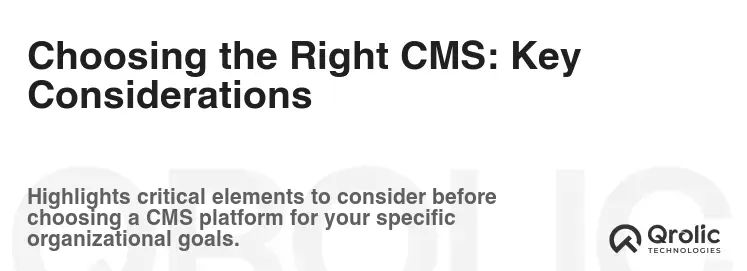
So, which CMS is right for your business? Here’s a breakdown to help you make the decision:
Choose WordPress if:
- You need maximum design flexibility and customization.
- You have a limited budget and are comfortable with managing your own website.
- You need advanced e-commerce functionality.
- You have the technical expertise or are willing to learn.
- You want complete control over your website’s code and data.
Choose HubSpot CMS Hub if:
- You prioritize ease of use and a streamlined workflow.
- You’re heavily invested in the HubSpot ecosystem and need seamless integration with its other tools.
- You want a managed platform that handles security and maintenance.
- You need built-in marketing tools and automation.
- You’re willing to pay a premium for convenience and integration.
Consider these questions to guide your decision:
- What are your technical skills? Are you comfortable with coding and troubleshooting technical issues?
- What is your budget? How much can you afford to spend on hosting, themes, plugins, and maintenance?
- What are your marketing goals? Do you need advanced marketing automation features?
- What is the size and complexity of your website? Do you need e-commerce functionality?
- How important is security and maintenance? Do you want a managed platform or are you willing to handle these tasks yourself?
Real-World Scenarios: HubSpot CMS vs. WordPress in Action
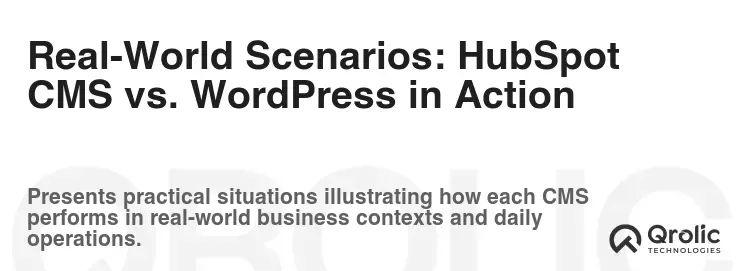
Let’s illustrate these points with some real-world scenarios:
-
Scenario 1: Small Business Blogger (Minimal Budget, Low Technical Skills)
- Needs: A simple, easy-to-use platform for blogging and sharing content.
- Recommendation: HubSpot CMS Hub (Free or Starter Plan). Its drag-and-drop interface and built-in blogging tools make it easy to create and publish content without technical expertise. The free plan might suffice initially, with the option to upgrade to the Starter plan for more features.
-
Scenario 2: Growing E-commerce Store (High Customization Needs, Growing Budget)
- Needs: A robust e-commerce platform with advanced features, extensive customization options, and the ability to scale.
- Recommendation: WordPress with WooCommerce. WooCommerce provides the necessary e-commerce functionality and customization options, while WordPress offers the flexibility to tailor the website’s design and features to the specific needs of the business. Hiring a developer or agency for setup and ongoing maintenance is recommended.
-
Scenario 3: Marketing Agency (Integrated Marketing Platform, Focus on Lead Generation)
- Needs: A CMS that seamlessly integrates with marketing automation tools, provides built-in SEO features, and facilitates lead generation.
- Recommendation: HubSpot CMS Hub (Professional or Enterprise Plan). The tight integration with HubSpot’s marketing platform, built-in SEO tools, and lead capture forms make it an ideal choice for marketing agencies. The Professional or Enterprise plan provides the necessary features for managing multiple clients and executing sophisticated marketing campaigns.
-
Scenario 4: Non-Profit Organization (Limited Budget, Focus on Content and Community)
- Needs: An affordable platform for sharing information, engaging with the community, and accepting donations.
- Recommendation: WordPress. WordPress offers a wide range of free themes and plugins suitable for non-profit organizations. Setting up donation forms and integrating with social media platforms is relatively straightforward. Careful planning and community contributions can help manage costs.
Qrolic Technologies: Your Partner in Digital Success
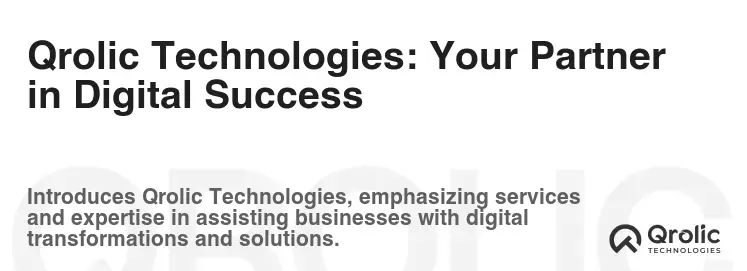
Navigating the complexities of CMS selection and website development can be daunting. That’s where Qrolic Technologies (https://qrolic.com/) comes in. We are a team of experienced web developers, designers, and marketers dedicated to helping businesses of all sizes achieve their online goals.
How Qrolic Technologies Can Help:
- CMS Consulting: We can help you assess your business needs and determine the best CMS platform for your specific requirements.
- WordPress Development: We offer custom WordPress theme development, plugin development, and website maintenance services.
- HubSpot CMS Hub Implementation: We can help you set up and configure your HubSpot CMS Hub website, integrate it with your existing marketing tools, and provide ongoing support.
- SEO Optimization: We can optimize your website for search engines, helping you improve your rankings and attract more organic traffic.
- Content Creation: We can create engaging and informative content that resonates with your target audience.
Whether you choose WordPress or HubSpot CMS Hub, Qrolic Technologies can provide the expertise and support you need to build a successful online presence. Contact us today to learn more about our services and how we can help you achieve your digital goals.
Making the Final Call: It’s All About Your Needs
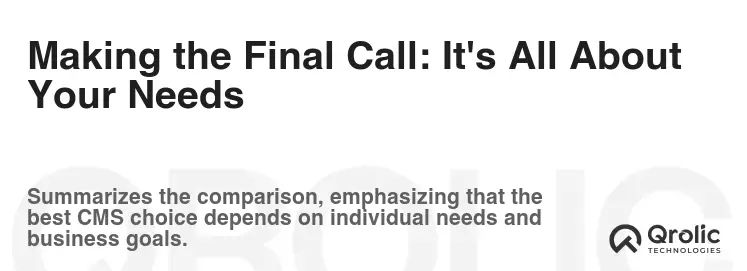
The ultimate decision of whether to go with HubSpot CMS Hub or WordPress boils down to your unique business requirements, technical capabilities, and budget. There’s no one-size-fits-all answer.
Think of it this way:
- HubSpot CMS Hub is like buying a pre-built, high-performance sports car. It’s sleek, powerful, and comes with all the latest features. However, you have limited ability to modify the engine or customize the body.
- WordPress is like building your own car from scratch. You have complete control over every aspect of the design and functionality, but it requires a significant investment of time, effort, and technical expertise.
Carefully weigh the pros and cons of each platform, consider your long-term goals, and choose the CMS that will empower you to achieve your business objectives. And remember, Qrolic Technologies is here to help you every step of the way!






